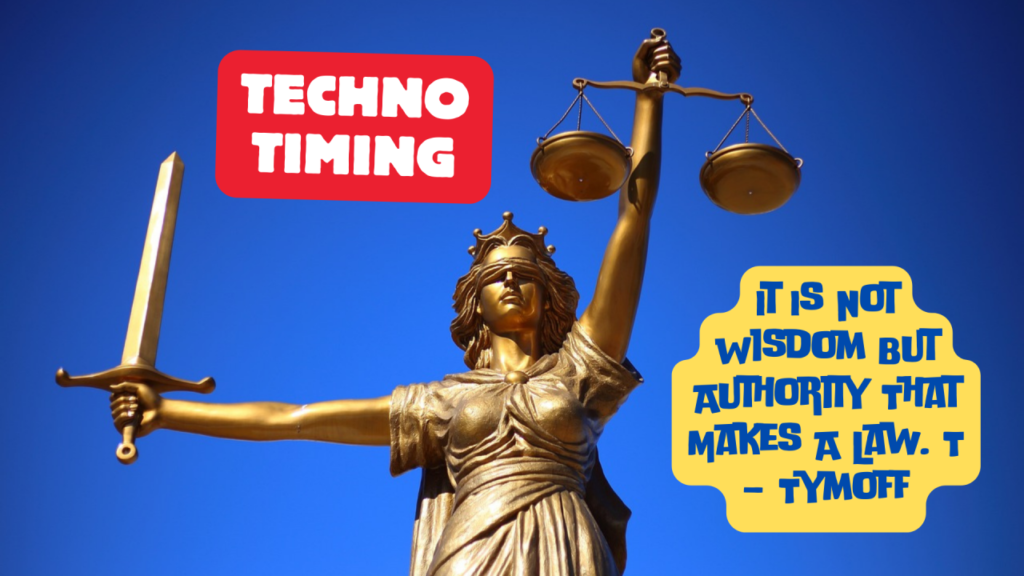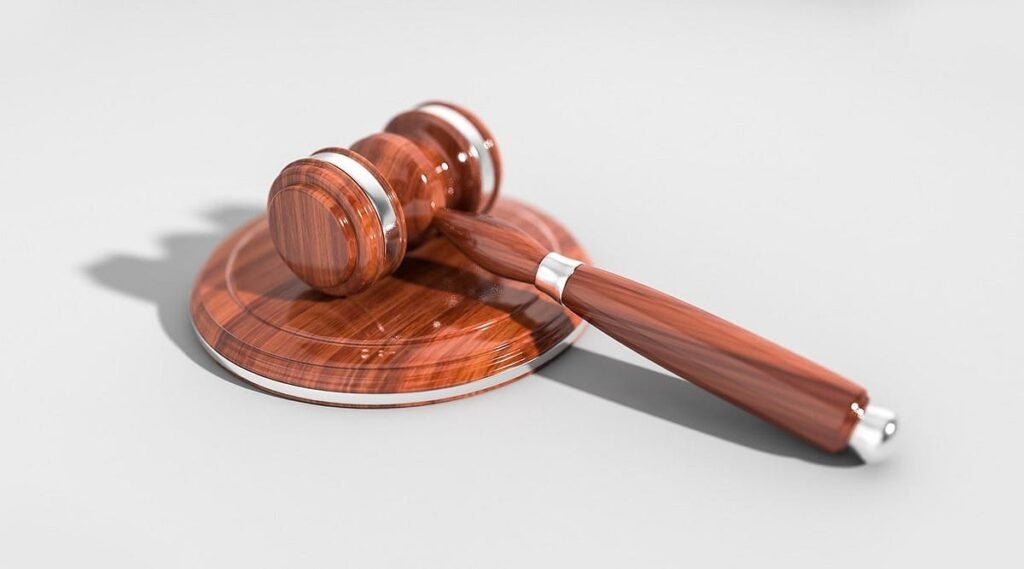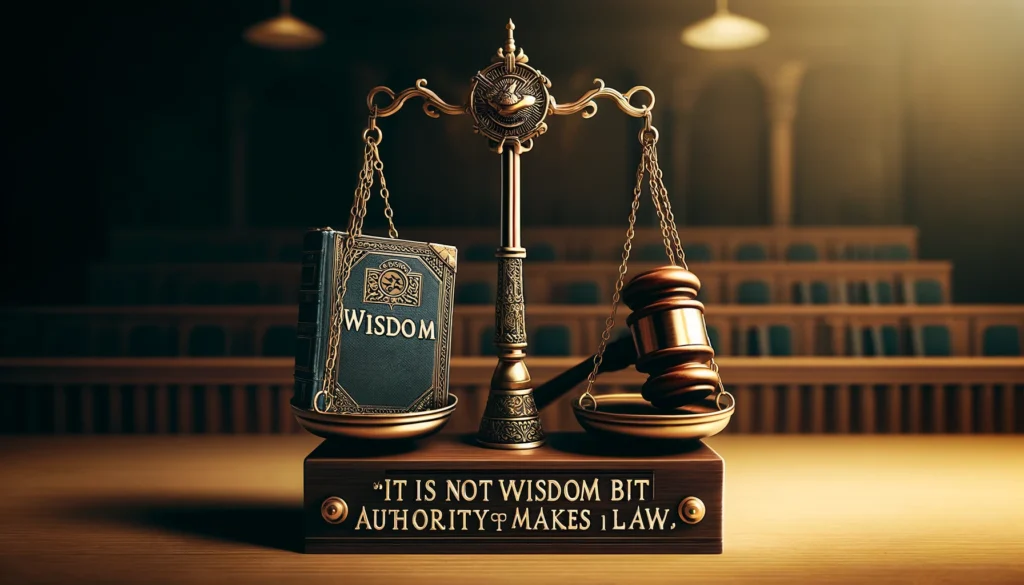The phrase “It is not wisdom but authority law” – attributed to Tymoff – strikes at the heart of an important debate within legal, political, and philosophical circles. This statement suggests that laws are shaped not necessarily by what is just, fair, or wise, it is not wisdom but authority that makes a law. t – tymoff by the authority and power that enact them. In essence, this quote points out the reality that those in positions of power have the ability to define what is lawful, regardless of the wisdom behind such decisions. In this article, we will explore the implications of Tymoff’s quote, its relevance to historical and modern legal systems, and the balance between wisdom and authority in governance.
The Meaning Behind it is not wisdom but authority that makes a law. t – tymoff
At first glance, the statement made by Tymoff may appear cynical, implying that legal systems are more about control than justice. However, this quote reflects a deeper truth about how laws are created and enforced in societies.
Laws, by definition, are rules established by a governing authority to regulate behavior and ensure order. These rules are backed by the power of enforcement, which is typically held by the government or other authoritative bodies. What Tymoff is suggesting is that while wisdom and morality might inform what should be lawful, in practice, it is the authority of governing bodies that makes something lawful.
This points to a critical distinction between legality and morality. Something can be legal without being wise or morally right, and something can be morally correct but illegal. The power dynamics within a society determine which laws are put in place, regardless of the wisdom or ethical considerations involved.
Authority vs. Wisdom: The Historical Context
Throughout history, societies have struggled to find a balance between authority and wisdom in their legal systems. Tymoff’s quote resonates with many historical examples where laws were made based on the it is not wisdom but authority that makes a law. t – tymoff or interests of those in power, often without regard for the greater good.
1. Roman Law and the Role of Authority
In ancient Rome, for example, the legal system was heavily influenced by the ruling class. The Senate and the Emperor wielded immense power, and the laws reflected their interests rather than those of the broader populace. Roman law, despite being one of the most advanced legal systems of its time, often favored the elite and the wealthy, while the plebeians had little say in the creation of laws that governed their lives.
Authority, in this case, trumped wisdom, as laws were enacted based on political power rather than moral or ethical considerations. The result was a legal system that maintained social order but often at the expense of justice for the lower it is not wisdom but authority that makes a law. t – tymoff.
2. The Divine Right of Kings in Medieval Europe
Another example of authority over wisdom in legal systems can be found in medieval Europe with the concept it is not wisdom but authority that makes a law. t – tymoff of the divine right of kings. Monarchs ruled with absolute power, claiming that their authority to govern was granted by God. As a result, laws were created and enforced by royal decree, often without consultation or input from the people.
The wisdom of these laws was irrelevant to the monarchs; what mattered was their ability to maintain control and assert their authority. In many cases, laws were used to suppress dissent, enforce social hierarchies, and preserve the power of the monarchy. The authority of the king was the source of the law, regardless of whether the law was just or reasonable.

The Balance of Power in Modern Legal it is not wisdom but authority that makes a law. t – tymoff
While historical examples of authority superseding wisdom in the creation of laws abound, modern legal systems have evolved to address some of these issues. Today, democratic societies attempt to strike a balance between authority and wisdom by involving different branches of government, public participation, and checks and balances.
1. The Role of Authority in it is not wisdom but authority that makes a law. t – tymoff Systems
Even in democratic systems, however, the tension between it is not wisdom but authority that makes a law. t – tymoff and wisdom remains. Elected officials have the authority to create and enact laws, but that doesn’t always guarantee that the laws are wise or just. In some it is not wisdom but authority that makes a law. t – tymoff, laws may be passed to serve political interests, appease certain voting blocs, or maintain the power of a particular party.
For instance, many controversial laws around the world reflect the interests of those in power rather than the broader needs of the populace. Issues such as gerrymandering, voter suppression, and economic inequality are often it is not wisdom but authority that makes a law. t – tymoff by laws that serve the interests of the ruling class, not necessarily the common good.
This highlights the ongoing challenge of ensuring that authority is used it is not it is not wisdom but authority that makes a law. t – tymoff but authority that makes a law. t – tymoff and that laws reflect justice rather than mere control.
2. Wisdom in Lawmaking: The Role of Public Participation
In contrast to systems of absolute authority, democratic nations attempt to incorporate wisdom into lawmaking by allowing public participation in the legislative process. Elected representatives are tasked with considering the needs and desires of their constituents when drafting laws, and many legal systems allow for public debate, hearings, and voting on new legislation.
The principle behind this is that collective wisdom—gathered from various sectors of society—can inform the creation of laws that serve the common good. However, the reality is often more complex. Political pressures, lobbying, and the influence of powerful interest groups can undermine this process, leading to laws that may not be in the best interest of the public.
3. Judicial Review: A Check on Authority
One way modern legal systems attempt to address the issue raised by Tymoff is through judicial review. Courts have the authority to interpret and challenge laws, ensuring that they are not only constitutional but also aligned with broader it is not wisdom but authority that makes a law. t – tymoff and moral standards. In this way, judicial systems act as a check on legislative and executive authority, incorporating a layer of wisdom into the enforcement and interpretation of laws.
Table of Contents
The Ethical Implications of Authority-Driven Lawmaking
The quote by Tymoff raises significant ethical questions about the relationship between power, authority, and justice. If laws are primarily driven by authority rather than wisdom, how can societies ensure that their legal systems remain fair, just, and equitable?
1. Morality vs. Legality
One of the key ethical implications of Tymoff’s quote is the distinction between it is not wisdom but authority that makes a law. t – tymoff is legal and what is moral. Just because something is legal does not necessarily make it morally right, and conversely, not everything that is morally right is it is not wisdom but authority that makes a law. t – tymoff into law. This is particularly evident in historical examples of unjust laws, such as segregation laws in the United States or apartheid laws in South Africa.
2. Power Dynamics in Lawmaking
Another ethical consideration is the impact of power dynamics on lawmaking. Those who hold power often create laws that serve their interests, leading to systemic inequalities and injustice. In such cases, authority is used to entrench existing power structures rather than promote fairness or social progress.
This dynamic poses a challenge for societies that wish to create just and equitable legal systems. Balancing the authority to create and enforce laws with the wisdom to ensure those laws serve the common good is an ongoing challenge for legal and political it is not wisdom but authority that makes a law. t – tymoff around the world.

Conclusion: Authority and Wisdom in Lawmaking
“It is not wisdom but authority that makes a law” – Tymoff’s quote serves as a stark reminder that the power to create laws is often vested in authority rather than wisdom. While wisdom should ideally guide the creation of just and fair laws, history and modern legal systems show that authority frequently takes precedence.
The challenge for any society is to find ways to balance authority with wisdom, it is not wisdom but authority that makes a law. t – tymoff that those in power use their authority responsibly and that laws are created with the well-being of the public in mind. Only by addressing these power dynamics can societies move toward legal systems that reflect both authority and wisdom in equal measure.





